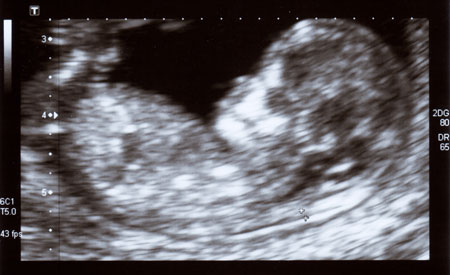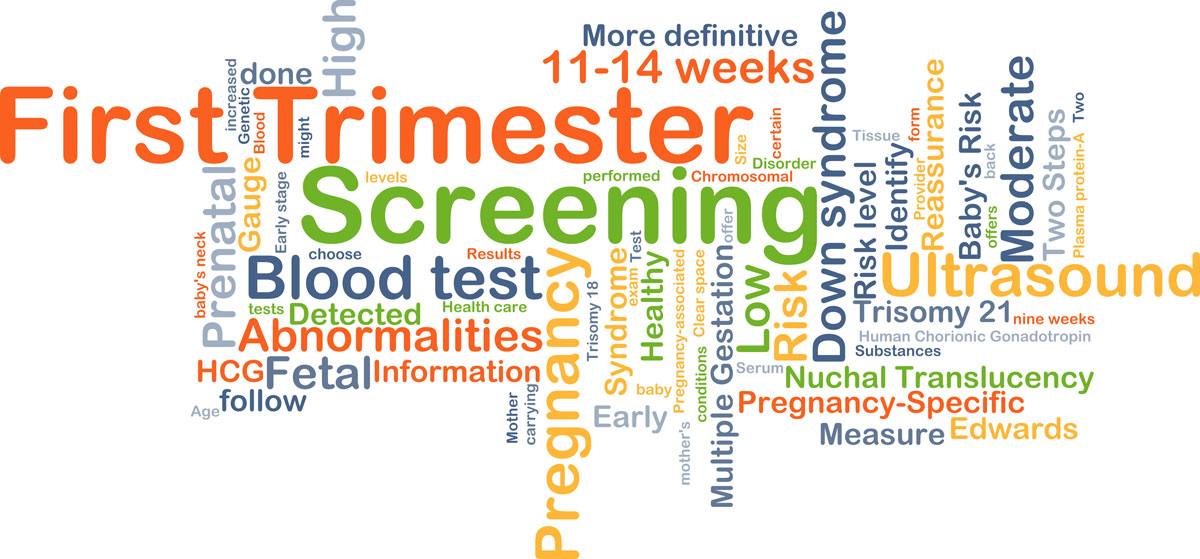How important is the nuchal translucency test in the 12-week scan?

The nuchal translucency test is part of the 12-week ultrasound scan, sometimes called first-trimester screening. Part of the scan involves measuring a specific part of the baby’s neck (the nuchal translucency).
At the same time, the 12-week scan also gives us a chance to:
- check for twins (or triplets!)
- measure the baby’s heartbeat
- check the location of the placenta
- pick up some other early problems.
As a bonus, you get to see your baby and often find out the sex (if you want to). How long does it take? Usually about half an hour.
Although we talk about it as the “12-week scan”, you can have it from 11.5 weeks up to 13 weeks + six days and still get an accurate result.
What information does the nuchal translucency test give us?
A nuchal translucency test combines a baby’s neck measurement, a blood test for pregnancy hormones and the mother’s age. Together they tell us if the baby has higher than average chances of Down syndrome and some other common chromosomal conditions.
Chromosomal conditions occur when something unusual happens with the chromosomes – the bundles of DNA – such as a missing chromosome or an extra copy.
Down syndrome is the most common chromosomal condition, occurring in about 1 in 400 pregnancies. People with Down syndrome have differences in their physical and intellectual development. You probably know that women over 35 have a higher risk of having a baby with Down syndrome. Surprisingly, most babies with Down syndrome are born to women under 35 (this is because more babies are born to younger women).
Other chromosomal conditions that the test can pick up include Edwards syndrome (trisomy 18) and Patau syndrome (trisomy 13). These two are more severe than Down Syndrome and have a high rate of pregnancy loss or infant death (for example, because of organs failing to develop properly.)
Why is this information important?
 Having this information about the chances of a chromosomal condition may be valuable for several reasons:
Having this information about the chances of a chromosomal condition may be valuable for several reasons:
- Most often, it provides reassurance that everything appears to be developing as it should.
- Sometimes, it lets parents prepare emotionally and physically if the baby has an abnormality.
- More rarely, it provides the opportunity to decide whether to continue with a pregnancy.
How accurate is nuchal translucency?
The nuchal translucency scan in combination with the mother’s age and a blood test is highly accurate, correctly picking up 90% of babies with Down syndrome and falsely indicating a baby as likely having Down syndrome 5% of the time.
What it doesn’t give you is a “yes/no” answer. On the one hand, if the test shows your baby has a higher than usual risk of a chromosomal condition, you might have a diagnostic test. The second test can give you more certainty about whether your baby has the condition or not.
The diagnostic test might be chorionic villous sampling (where a doctor takes a sample of placenta cells via the vagina) or amniocentesis (a doctor takes an amount of amniotic fluid via a fine needle through the belly). These tests carry their risks and benefits. If you have a higher than usual risk, you could talk over what it means with a genetic counsellor.
On the other hand, a low-risk result from the nuchal translucency test is still not guaranteed that there are no chromosomal problems. And, of course, it doesn’t check for any other type of health problems.
What about the new blood test – non-invasive prenatal testing?
Non-invasive prenatal testing (NIPT) is a relatively new blood test to check for chromosomal conditions. It’s even more accurate than the nuchal translucency test.
However, you will probably still have the 12-week ultrasound scan to check other aspects of the pregnancy. The new NIPT blood test is also out of reach for many parents, costing between $300 and $600.

Are there any risks with the 12-week scan?
Ultrasound means “beyond sound”. Ultrasound scans use sound waves that are too high-pitched for us to hear. The machine measures how the sound waves bounce back from your body to create a picture of what’s there.
The World Health Organisation reviewed 61 different studies into the safety of ultrasound in pregnancy and found no side effects for mothers or babies, such as problems with development or brain health.
Scientifically, we can’t say an ultrasound can’t cause side effects. There are concerns about the potential biological effects on the body. Ultrasound can heat tissues – the significance of this is currently unknown. Also, there’s a lack of high-quality scientific studies looking at the effect of modern high-powered ultrasound machines on babies.
Of course, some mothers choose not to have the test. For example, they prefer to avoid undue anxiety over a slightly increased risk of abnormalities. They also want to avoid being put in the position of deciding whether to continue with the pregnancy if there are problems found.
Is the test compulsory?
No, the test is voluntary. Like any test or procedure offered to you in pregnancy, you have the right to say no. So you should expect to make an informed choice about whether to have the test based on your situation and what you would do with the information. Whether to have the test or not is an important one – work through any concerns with your midwife or doctor.
Reference List
PBB aims to keep you informed with the latest research-based information. Check out our reference list used in the creation of this article.
Published 21st March 2020
About the Author
Louise Wedgwood is a freelance health and parenting writer, working with magazines, online publications and businesses. She has a background in health science, and enjoys helping parents make evidence-based choices. Her own children have shown her making the right decisions is never black-and-white.
Share this Post
Recent Posts
- How important is the nuchal translucency test in the 12-week scan?
- 7 of Australia’s newest and best baby books for new parents
- Postpartum hair loss – are you going bald, and what can you do to stop it?
- Have you heard of the benefits of watermelon during pregnancy?
- How to feel better with perinatal anxiety – during or after pregnancy
Recent Comments
- Danni on Sydney Hospitals
- biggbosstheory on Early ovulation on the 9th day of your cycle. Is it a problem?
- Jane Palmer on Early ovulation on the 9th day of your cycle. Is it a problem?
- biggbosstheory on Early ovulation on the 9th day of your cycle. Is it a problem?
- Laura-Jane Marsden on Early ovulation on the 9th day of your cycle. Is it a problem?
Archives
Categories
PBB’s Social Media Pages
The post How important is the nuchal translucency test in the 12-week scan? appeared first on Pregnancy Birth and Beyond.
Read Original Article: How important is the nuchal translucency test in the 12-week scan? »



